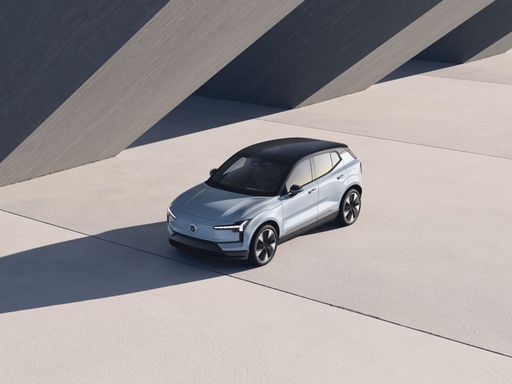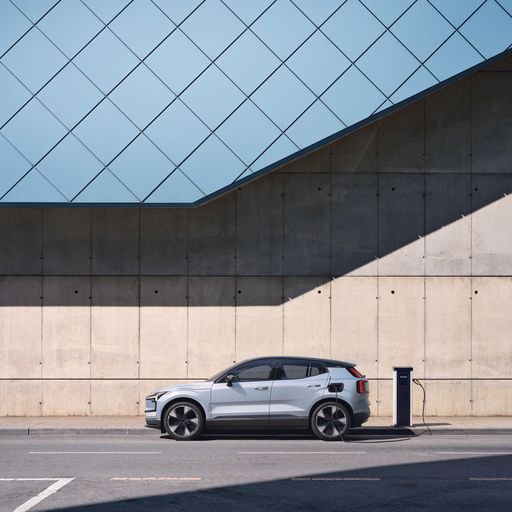Nissan Leaf vs Volvo EX30 - Differences and prices compared
Compare performance (217 HP vs 428 HP), boot space and price (30800 £ vs 33000 £ ) at a glance. Find out which car is the better choice for you – Nissan Leaf or Volvo EX30?
Costs and Efficiency:
When it comes to price and running costs, the biggest differences usually appear. This is often where you see which car fits your budget better in the long run.
Nissan Leaf has a slight advantage in terms of price – it starts at 30800 £ , while the Volvo EX30 costs 33000 £ . That’s a price difference of around 2220 £.
In terms of energy consumption, the advantage goes to the Nissan Leaf: with 16.70 kWh per 100 km, it’s barely noticeable more efficient than the Volvo EX30 with 17 kWh. That’s a difference of about 0.30 kWh.
As for electric range, the Volvo EX30 performs somewhat better – achieving up to 476 km, about 91 km more than the Nissan Leaf.
Engine and Performance:
Power, torque and acceleration say a lot about how a car feels on the road. This is where you see which model delivers more driving dynamics.
When it comes to engine power, the Volvo EX30 has a convincingly edge – offering 428 HP compared to 217 HP. That’s roughly 211 HP more horsepower.
In acceleration from 0 to 100 km/h, the Volvo EX30 is significantly quicker – completing the sprint in 3.60 s, while the Nissan Leaf takes 6.90 s. That’s about 3.30 s faster.
In terms of top speed, the Volvo EX30 performs to a small extent better – reaching 180 km/h, while the Nissan Leaf tops out at 157 km/h. The difference is around 23 km/h.
There’s also a difference in torque: Volvo EX30 pulls evident stronger with 543 Nm compared to 340 Nm. That’s about 203 Nm difference.
Space and Everyday Use:
Cabin size, boot volume and payload all play a role in everyday practicality. Here, comfort and flexibility make the difference.
Both vehicles offer seating for 5 people.
In curb weight, Nissan Leaf is somewhat lighter – 1580 kg compared to 1840 kg. The difference is around 260 kg.
In terms of boot space, the Nissan Leaf offers somewhat more room – 394 L compared to 318 L. That’s a difference of about 76 L.
In maximum load capacity, the Volvo EX30 performs evident better – up to 1000 L, which is about 210 L more than the Nissan Leaf.
When it comes to payload, Nissan Leaf hardly perceptible takes the win – 415 kg compared to 390 kg. That’s a difference of about 25 kg.
Who comes out on top?
Overall, the Volvo EX30 shows itself to be outperforms in nearly all aspects and secures the title of DriveDuel Champion.
It convinces with the more balanced overall package and proves to be the more versatile choice for everyday use.

Volvo EX30
Costs and Consumption
View detailed analysis
Engine and Performance
View detailed analysis
Dimensions and Body
View detailed analysis
Nissan Leaf
The Nissan Leaf is a practical, easygoing electric hatch that turns daily commutes into a quiet, effortless affair while offering more cabin space than it lets on. It’s a sensible, wallet-friendly step into electrification for buyers who value comfort and simplicity over sporty drama, though those chasing long-distance thrills might look elsewhere.
details



Volvo EX30
The Volvo EX30 arrives as a compact electric with crisp Scandinavian design and a cheeky personality, proving you can be serious about safety and still enjoy a grin on your commute. Its cabin is cleverly packaged and delightfully easy to live with, offering smart tech and practical touches that make it feel like a grown-up's city car with a sense of fun.
details




Costs and Consumption |
|
|---|---|
|
Price
30800 - 37200 £
|
Price
33000 - 49100 £
|
|
Consumption L/100km
-
|
Consumption L/100km
-
|
|
Consumption kWh/100km
16.7 - 17.8 kWh
|
Consumption kWh/100km
17 - 18.7 kWh
|
|
Electric Range
270 - 385 km
|
Electric Range
339 - 476 km
|
|
Battery Capacity
39 - 59 kWh
|
Battery Capacity
49 - 65 kWh
|
|
co2
0 g/km
|
co2
0 g/km
|
|
Fuel tank capacity
-
|
Fuel tank capacity
-
|
Dimensions and Body |
|
|---|---|
|
Body Type
Hatchback
|
Body Type
SUV
|
|
Seats
5
|
Seats
5
|
|
Doors
5
|
Doors
5
|
|
Curb weight
1580 - 1756 kg
|
Curb weight
1840 - 1960 kg
|
|
Trunk capacity
385 - 394 L
|
Trunk capacity
318 L
|
|
Length
4490 mm
|
Length
4233 mm
|
|
Width
1788 mm
|
Width
1838 mm
|
|
Height
1540 - 1545 mm
|
Height
1550 - 1567 mm
|
|
Max trunk capacity
790 L
|
Max trunk capacity
1000 L
|
|
Payload
384 - 415 kg
|
Payload
370 - 390 kg
|
Engine and Performance |
|
|---|---|
|
Engine Type
Electric
|
Engine Type
Electric
|
|
Transmission
Automatic
|
Transmission
Automatic
|
|
Transmission Detail
Reduction Gearbox
|
Transmission Detail
Reduction Gearbox
|
|
Drive Type
Front-Wheel Drive
|
Drive Type
Rear-Wheel Drive, All-Wheel Drive
|
|
Power HP
150 - 217 HP
|
Power HP
272 - 428 HP
|
|
Acceleration 0-100km/h
6.9 - 7.9 s
|
Acceleration 0-100km/h
3.6 - 5.7 s
|
|
Max Speed
144 - 157 km/h
|
Max Speed
180 km/h
|
|
Torque
320 - 340 Nm
|
Torque
343 - 543 Nm
|
|
Number of Cylinders
-
|
Number of Cylinders
-
|
|
Power kW
110 - 160 kW
|
Power kW
200 - 315 kW
|
|
Engine capacity
-
|
Engine capacity
-
|
General |
|
|---|---|
|
Model Year
2019
|
Model Year
2024 - 2025
|
|
CO2 Efficiency Class
A
|
CO2 Efficiency Class
A
|
|
Brand
Nissan
|
Brand
Volvo
|
What drivetrain options does the Nissan Leaf have?
Available configurations include Front-Wheel Drive.




